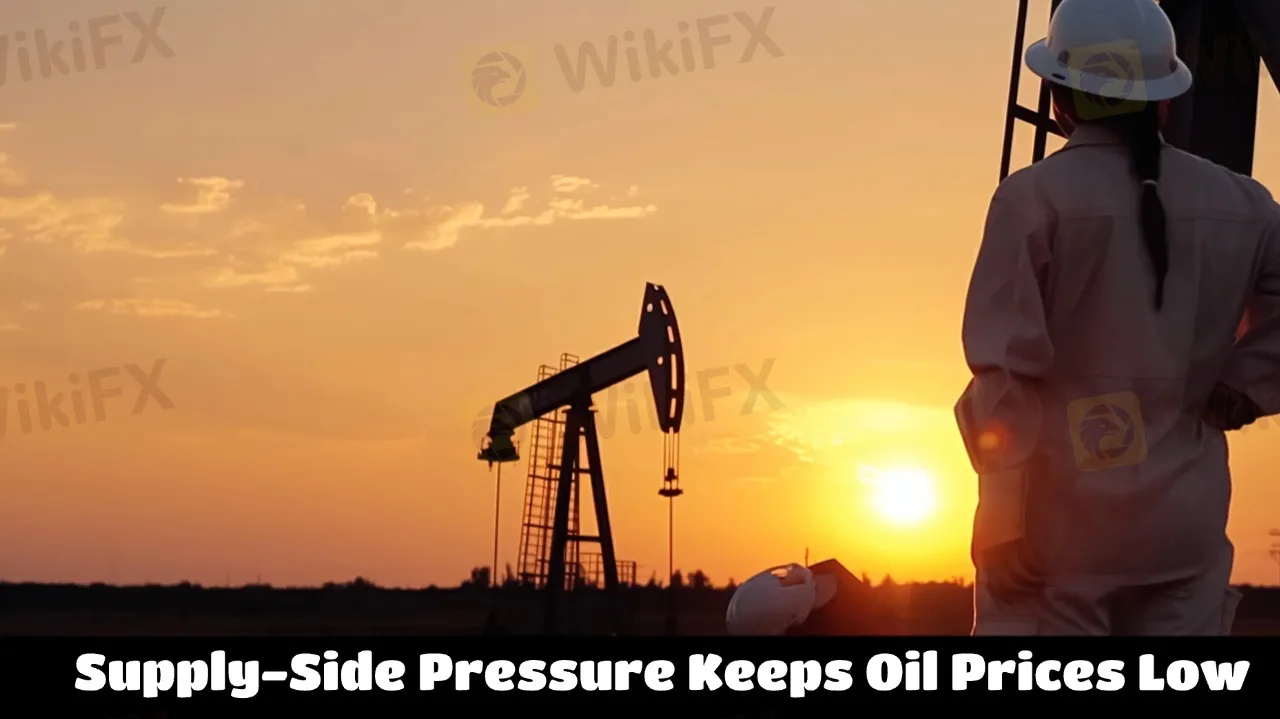简体中文
繁體中文
English
Pусский
日本語
ภาษาไทย
Tiếng Việt
Bahasa Indonesia
Español
हिन्दी
Filippiiniläinen
Français
Deutsch
Português
Türkçe
한국어
العربية
Supply-Side Pressure Keeps Oil Prices Low
Abstract:Oil prices are facing supply-side pressure, and their future trends remain highly uncertain, as geopolitical and economic factors intertwine to influence the market.

Recently, international oil prices have slightly declined, primarily due to Russia agreeing to temporarily stop attacking Ukraine's energy infrastructure. This ceasefire agreement has raised expectations of Russia's oil potentially returning to the market, thus exerting downward pressure on oil prices. Brent crude futures fell by 0.2%, settling at $70.44 per barrel, while U.S. WTI crude futures dropped by 0.2%, to $66.75 per barrel.
Since the outbreak of the Russia-Ukraine conflict, Russian oil exports have been restricted by sanctions, leading to a reduction in supply. With the ceasefire agreement, the market generally expects that if the situation further eases, sanctions could be relaxed, allowing Russian oil supply to increase, which would place downward pressure on oil prices. However, President Putin has only agreed to temporarily stop attacking Ukraine's energy infrastructure, and a comprehensive ceasefire agreement has not been reached, leaving the situation uncertain.
Furthermore, instability in the Middle East continues to affect oil prices. U.S. actions against Yemen's Houthi rebels, Israeli airstrikes on Gaza, and other conflicts have intensified concerns over potential disruptions to oil supply, which has limited the downward movement in oil prices.
Future Oil Price Outlook
In the short term, oil prices may fluctuate within a range, influenced by global economic conditions, geopolitical risks, and other factors. The market will closely monitor the progress of negotiations between Russia and Ukraine, as well as the situation in the Middle East, which may escalate further. If there are more significant supply disruptions, oil prices may rebound quickly.
In the medium to long term, oil prices will continue to face considerable uncertainty. The global economic outlook, changes in demand, and fluctuations in supply will keep influencing the market. Even if Russian oil supply increases, ongoing conflicts in the Middle East and uncertainties in the U.S. economy will continue to put pressure on oil prices. Investors must respond flexibly, stay alert to policy changes and market dynamics, and seize the right opportunities to buy or sell.

Disclaimer:
The views in this article only represent the author's personal views, and do not constitute investment advice on this platform. This platform does not guarantee the accuracy, completeness and timeliness of the information in the article, and will not be liable for any loss caused by the use of or reliance on the information in the article.
Read more

Is Your Money Safe with Libra Markets? Check Out Fast!
n this exposure episode, we will take you through the heinous game played by Libra Markets, an unregulated forex broker. Take a look at how people are facing issues regarding withdrawals.

TradeHall vs. HYCM: Which Broker Should You Choose?
When choosing a broker, understanding the difference between superficial features and real regulatory protection is essential. In this article, WikiFX will compare TradeHall and HYCM. While on the surface, both brokers offer a wide range of trading instruments, the real difference lies in their regulatory statuses, which is a commonly overlooked factor for traders when they opt for brokers.

Trade Nation vs. FBS: Which Broker Is Better for New Traders?
If you're new to trading, choosing the right broker can feel overwhelming. Two popular choices, Trade Nation and FBS, offer very different experiences. This comparison breaks down which is better suited for beginners, based on ease of use, safety, costs, and support.

Exness Acquires €75 Million Property in Cyprus for Future Growth
Exness, a leading forex trading broker, has purchased a €75 million property in Cyprus, securing 200,000 square meters for expansion, including potential employee housing or a new campus.
WikiFX Broker
Latest News
Tether Freezes $12.3 Million in USDT Over Money Laundering Concerns
MiCA Unlocks EU Crypto Market, but National Tensions Rise as Gemini and Coinbase Near Approval
Retirement Dreams Shattered: Don't Do This To Yourself!
Philippines Sets Southeast Asia’s First Crypto Regulatory Framework
EU Regulators Imposed Over €71M in Sanctions in 2024, ESMA Calls for Enforcement Convergence
FortuixAgent Review 2025: Is it Scam or Legit?
Danske Bank expects the European Central Bank to make its final interest rate cut in September.
No Regulation, Revoked Licence: Is Tradehall Safe to Use?
FXGT.com Trading Platform Review 2025
ATTENTION! Red Alert on These Brokers !
Currency Calculator



